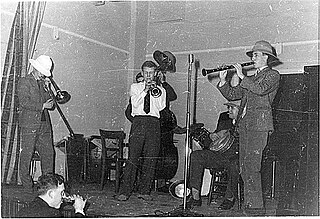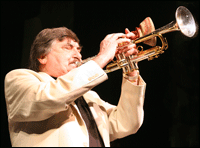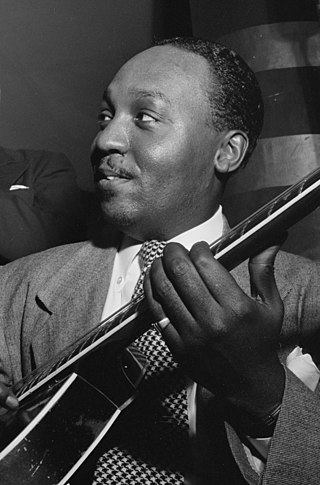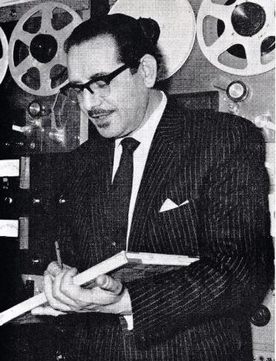Related Research Articles

Humphrey Richard Adeane Lyttelton, also known as Humph, was an English jazz musician and broadcaster from the Lyttelton family.

Bernard Stanley "Acker" Bilk, was an English clarinetist and vocalist known for his breathy, vibrato-rich, lower-register style, and distinctive appearance – of goatee, bowler hat and striped waistcoat.

Fellside Recordings is a British independent record label, formed by Paul Adams and Linda Adams in 1976 in Workington, Cumbria, and still run by them.

Trad jazz, short for "traditional jazz", is a form of jazz in the United States and Britain that flourished from the 1930s to 1960s, based on the earlier New Orleans Dixieland jazz style. Prominent English trad jazz musicians such as Chris Barber, Freddy Randall, Acker Bilk, Kenny Ball, Ken Colyer and Monty Sunshine performed a populist repertoire that also included jazz versions of pop songs and nursery rhymes.

Kenneth Daniel Ball was an English jazz musician, best known as the bandleader, lead trumpet player and vocalist in Kenny Ball and His Jazzmen.

Albert Aloysius Casey was an American jazz guitarist who was a member of Fats Waller's band during the 1930s and early 1940s.

Kenneth Colyer was an English jazz trumpeter and cornetist, devoted to New Orleans jazz. His band was also known for skiffle interludes.
Don Lusher OBE was an English jazz and big band trombonist best known for his association with the Ted Heath Big Band. In a career spanning more than 60 years, he played trombone with a number of jazz orchestras and bands and was twice President of the British Trombone Society.

Alan Barnes is a multi-award winning English jazz saxophone and clarinet player.
Anthony George Coe was an English jazz musician who played clarinet, bass clarinet, and flute as well as soprano, alto, and tenor saxophones.
Stanley Mackay Greig was a Scottish pianist, drummer, and bandleader.
Peter Sidney "Mick" Mulligan was an English jazz trumpeter and bandleader, best known for his presence on the trad jazz scene.
Peter Charles Strange was an English jazz trombonist, arranger and composer.

The Concorde Club was launched in 1957 in Southampton by jazz aficionado Cole Mathieson, and is the oldest jazz club under the same management in the United Kingdom. Its standing in the UK jazz world has been recognised by the August 2009 award of the inaugural Blue Plaque, following a nationwide vote among jazz followers and musicians organised by the Brecon Jazz Festival. The award, celebrating the 50th anniversary of the Miles Davis classic album Kind of Blue, is to honour the jazz establishment considered to have done most for the development of jazz in the United Kingdom. On August 8 2012, the club celebrated its 55th anniversary with a concert featuring the Alan Barnes All Stars during which Barnes presented an illustrated history of the Concorde. He told the capacity crowd: "There are very few businesses, let alone a jazz club, run by the same person for 55 years. Cole has done more than most to promote jazz."

Sidney Denis Preston was a British record producer, recording studio owner, radio presenter and music critic. He was particularly influential in the British jazz and associated skiffle scenes from the 1940s to the 1960s.
The Humph Trust was established in the name of British jazz musician Humphrey Lyttelton to raise money for young jazz musicians.

David John Green is an English jazz bassist.
Christopher Columbus is an American jazz song composed by Chu Berry with lyrics by Andy Razaf. Pianist Fats Waller turned the tune into a 1936 novelty hit which was subsequently recorded by numerous other artists and became a jazz standard. Jimmy Mundy wrote the lead into a medley with "Sing, Sing, Sing" for Benny Goodman.
Robert Dodsworth, better known as Bobby Worth, is a British jazz drummer. He was named the 1998 British Telecom Drummer of the Year.
Manchester Sports Guild (MSG) was a jazz and folk music venue in Manchester, England, that flourished from 1961 to 1973.
References
- Cooper/Kernfeld, "Bruce Turner". Grove Jazz online.